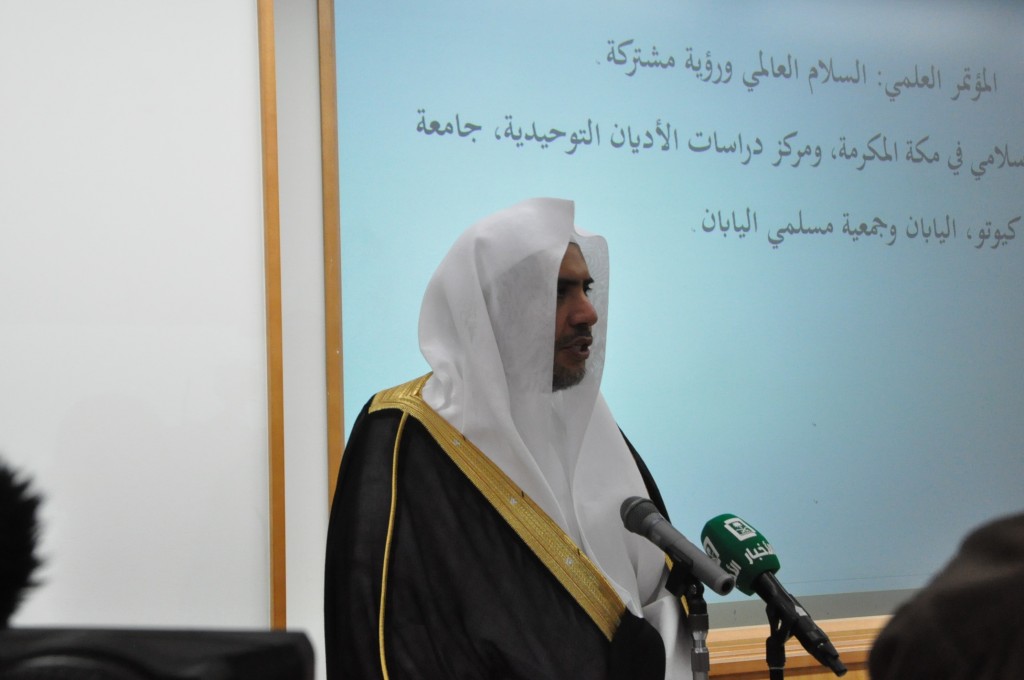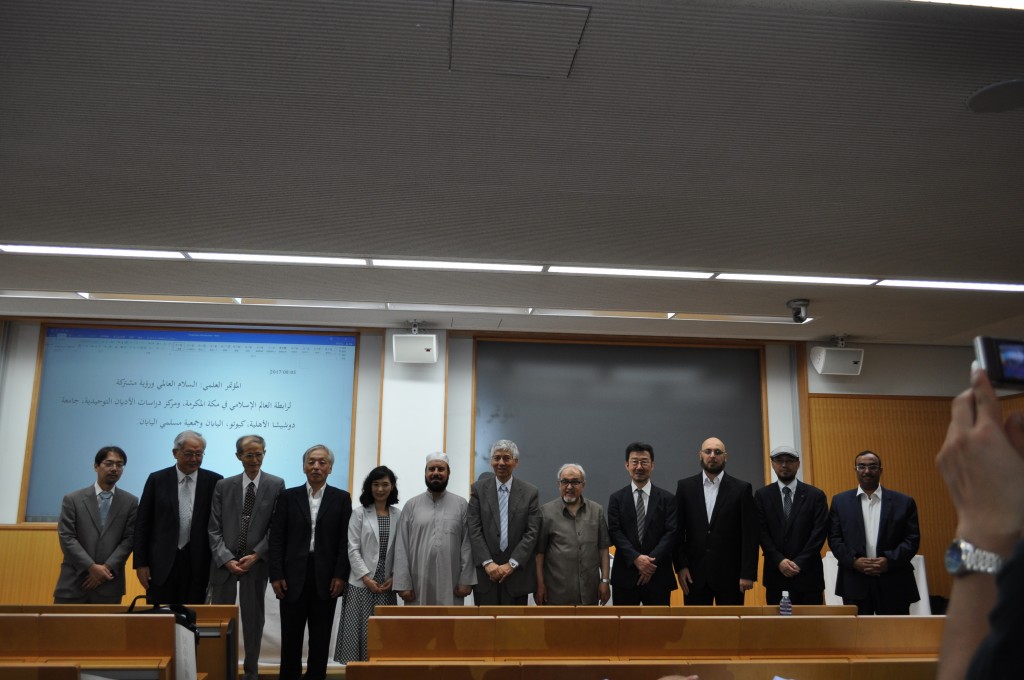Center for Interdisciplinary Study of Monotheistic Religions(CISMOR)Doshisha University
> Public Lectures > World Peace and Common Visions ※ResumePublic Lectures
CISMOR Symposium
World Peace and Common Visions ※Resume
| Date: |
2017/08/05 13:00-15:00 |
|---|---|
| Place: | Room RY107, Ryoshinkan, Imadegawa Campus, Doshisha University |
| Lecture: | H.E. Dr. Muhammad bin Abdul Karim Issa (The Muslim World League) |
| Summary: | |
|
At the opening of the symposium Katsuhiro Engetsu (Vice-president of Doshisha University), His Excellency the Secretary General of the Muslim World League Dr. Muhammad bin Abdul Karim al-Issa and Kimiaki Tokumasu (the head of the Japan Muslim Association) each made a speech. Dr. al-Issa (interpreter: Professor Junya Shinohe) emphasized that the purposes of the Muslim World League are to “promote teaching not only based on Muslims or Islam but from the perspective of humanity”, “clarify the meaning of Islam (such as co-existence with international society)”, “support the achievement of world peace and co-existence amongst the people of the world through integrating various fields such as politics, religions and cultures” and “press for the establishment of an environment enabling academic exchange, such as educational assistance”. A gift was then presented by the Muslim World League to Doshisha University, and the symposium was opened. In the morning session Professor Shinohe made a speech in which he made clear, through an analysis of Muhammad ibn Abd al-Wahhab’s “The Three Fundamental Principles” (theological founder of Saudi Arabia; d. 1792CE), the various ways in which al-Wahhab discussed the deepening of faith. Professor Shinohe emphasized the importance of understanding that what Al-Wahhab stressed was not monotheism but rather the fundamental Islamic denial of the polytheism (shirk) that distorted monotheism, and furthermore that Al-Wahhab was not the founder of extremism. Kimiaki Tokumasu, the head of the Japan Muslim Association, then gave a speech on ways to resolve the various threats to world peace, emphasizing the indispensability of international co-operation between states in order to overcome the opposition of economic interests. Moreover, he stressed that religious scholars and leaders must play a role in reviving people’s consciences around the world. Furthermore, as preconditions for conflict resolution dialogue, he listed “guaranteed impartiality”, “clear and honest language”, “patience and mutual respect”, “shared benefits between parties” and “an accurate grasp of disputes and their causes”. This was followed by a speech by Dr. Samir Nouh in which he proposed a number of ideas, such as an appeal for the necessity to revive religion within all fields of research. He posited that the poor quality of political science research produced by Japanese universities, which is based on the notion of unity of church and state within mainstream Islam, can be addressed by breaking away from Western understandings of Islam. In the afternoon Monqith Mahmood Al-Sakkar, an Advisor of the Department of International Organizations and Conferences of the Muslim World League, read out a speech written by His Excellency Muhammad bin Abdul Karim al-Issa (summarized in the next four paragraphs). It is said that although there have been conflicts throughout human history, the most violent have been those caused by religion. However, religions do not promote such conflicts but rather play a role in curbing them, and furthermore their teachings follow the fundamental principle of guiding people to lives of virtue. Although most major powers use religion as a pretext for going to war, upon close analysis it’s clear that the purpose is colonial ambition or economic advantage. A recent development has been the appearance of the term ‘Islamophobia’. Most research both within and beyond Europe has concluded that Islam is a religion of horror and terrorism, but although it’s the case that there are Muslims who support terrorism, no scholars who have properly studied Islam support it. We want people to recognize this. Because of people’s lack of accurate knowledge of Islam, the misunderstanding that it is a religion of terrorism has arisen. The significance of Islam is described in Qur’an 21:107: “And We have not sent you, [O Muhammad], except as a mercy to the worlds.” We believe that Allah did not send the Prophet Mohammed only for Muslims or Arabs, but for all living things. The Prophet stated that the message that is Islam was sent in order to perfect people’s ethics and morality. In other words, human moral values did not develop after the Prophet Mohammed; noble morals were always within people as instincts and the Prophet was sent to make people understand and perfect this. ‘An eye for an eye’ is human nature; the Christian concept of turning the other cheek is not found in Islam. Although there are ways to endure something, this cannot be done by going against man’s true character. Islam looks for a way that suits this real nature: the Qur’an tells us to “Fight in the way of Allah those who fight you…” [Qur’an 2:190] and “But if they cease, then there is to be no aggression except against the oppressors” [Qur’an 2:193]. His Excellency al-Issa emphasized that Islam is a religion of peace and that Islam and salam (peace) are etymologically identical and have the same meaning, and he anticipated that if people come to understand it through scientific and academic knowledge they will realize that Islam is not a terrorist religion. After His Excellency al-Issa’s keynote speech, Professor Hisae Nakanish delivered a speech in which she argued that guaranteeing people’s security is linked to maintaining their dignity. As an example she pointed out the rapid population growth in the Middle East and North Africa (MENA), and the fluidity of its people. She noted how social research on these immigrant groups has stressed their ongoing powerful economic influence on the MENA region’s Arab culture and Muslim society, and stressed that the true cause of the region’s instability and prolonged disputes is not only that states are seeking hegemony, but is actually people’s insecurity itself. She then emphasized that global partnership is indispensable for a more balanced and equitable region. Next, Dr. Ibrahim Chao, a former representative of the Taipei Economic and Cultural Representative Office in the Kingdom of Saudi Arabia (interpreter: Professor Shinohe), made a speech. He noted a number of points made in the keynote address, such as that the message of Islam is for all mankind and it is only appropriate that we accept it, that the role of morals is to align people’s actions in the right direction regarding the preservation of mankind, and that the idea that one’s group should be above another tends to manifest itself as conquest. Furthermore, he stressed the commonality that the Islamic values of impartiality, freedom and equality (which are shared with all mankind) have with world peace and global values. The symposium was finally brought to an end with a joint statement made on behalf of the Muslim World League and Doshisha University by Sadok Mahfoudhi (interpreter of the Muslim World League), which noted how the zeal of Muslims for achieving world peace had led to the holding of this seminar and listed a number of recommendations aimed at the seminar attendees: ① “Understand Islam, and don’t be misled by the views of extremists, which are full of hostility; rather, one should condemn acts of terror violence and murder.” ② “Religions, in particular Islam, are innocent of these acts.” ③ “Islamophobia must be rejected outright.” ④ “Religious leaders need to cooperate in the mediation that is needed to appreciate global cultures, achieve world peace, uphold a sense of values and bolster partnerships.” ⑤ “We need to work together to promote human relations, protect civil liberties and support the right of peoples to security, prosperity and freedom, and for a world where peace, justice, compassion and mutual respect is the norm.” ⑥ “To preserve the environment and comply with international agreements aimed at protecting people from arms and weapons of mass destruction.” ⑦ “We urge unity between the countries of the world so that support can be provided to migrants and those in difficulty.” ⑧ “Provide schools and families with noble religious values, and be wary of those who attempt to undermine human ideals and ethics and of those who seek to damage families.” ⑨ “Enable believers to exercise social responsibility and to integrate into society and contribute to its development.” ---------------- 1. Based in Mecca, the Muslim World League is the largest Islamic NGO (Non-Governmental Organisation). 2.Translations from the Qur’an in this article are based on those of Sahih International. Translated by Masaki Nagata |
|
|
*Admission Free, No Reservation Necessary. *Language: - Keynotespeech: Arabic. Interpretation will be provided. Workshop: Arabic or English. Brief explanation in Japanese. Organized by The Muslim World League, Japan Muslim Association, CISMOR of Doshisha University |
|
|
20170805poster Junya Shinohe_resume(Arabic/ Japanese) Kimiaki Tokumasu_resume (Arabic/ Japanese) Samir Nouh_resume (Arabic/ Japanese) Ibrahim Jiao_resume (Arabic) Hisae Nakanishi_resume (English) Joint Communique (English) 20170805program |
|

